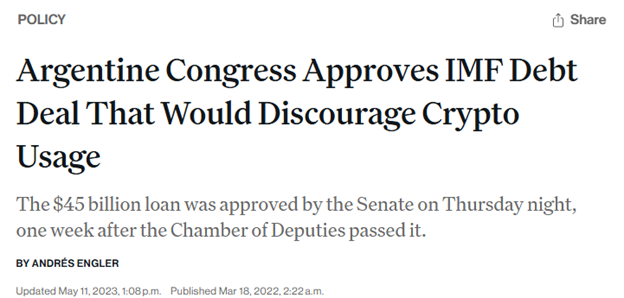 |
| By Bob Czeschin |
When tiny El Salvador declared Bitcoin (BTC, "A-") legal tender in 2021, President Bukele framed it as a lifeline for the unbanked in his country.
But it was also a protest against the U.S. dollar’s dominance.
This was a watershed moment for libertarians. For folks inclined to root for the underdog. And especially for true believers in the central promise of the crypto revolution, which is:
Honest, neutral money — immune to manipulation by corrupt governments and big-foot international institutions.
However, Bukele’s plucky policy decision was hardly welcome in the established halls of power.
The International Monetary Fund (IMF) — which commands resources 40 times tiny El Salvador’s GDP — swung into action to punish this perceived affront to its imperial prerogative.
IMF bosses threatened to deny a promised $1.4 billion loan El Salvador needed to avoid default on approaching bond repayments.
To release this money, the IMF forced Bukele to rescind legal tender for Bitcoin.

It also forced the end of a host of other crypto-friendly initiatives. Including the use of ultra-cheap geothermal energy for Bitcoin mining.
(With 23 active volcanos, El Salvador is a world leader in converting underground heat into abundant electric power.)
But El Salvador wasn’t the IMF’s only target.
The IMF’s International Anti-Bitcoin Tour
Pakistan, like El Salvador, has abundant energy resources.
In fact, it currently has significant idle electric power generation capacity.
So, in May crypto enthusiasts at the Pakistan Ministry of Finance proposed the allocation of up to 2,000 megawatts of surplus power to Bitcoin mining.
Such a project could generate substantial hard-currency income. Some of which Pakistan could use to service its outstanding IMF loans.
Even so, IMF bosses were not pleased and swiftly moved to block it.
And that’s just the start.
For decades, Argentina has suffered crippling inflation. That, in turn, has driven millions of ordinary folks into crypto as a store of value.
In fact, 45% of Argentinians have crypto accounts. That’s one of the world’s highest crypto adoption rates!
Javier Milei won Argentina’s presidential election by tapping into this shared experience. He campaigned against Argentina’s central bank, promising to abolish it in favor of a Bitcoin standard.
Libertarians and crypto enthusiasts cheered. But IMF bosses did not.
They could see which way the wind was blowing even before the election. So, in the final days of the outgoing regime, they quietly pushed through a binding $45 billion loan agreement.
Buried in the fine print was an enforceable, nonnegotiable loan condition no one had ever seen before. One that forced the government to “discourage cryptocurrency use.”

Result: Argentina’s central bank remains fat and happy. And bans all domestic financial institutions from crypto transactions.
How — you might wonder — can IMF bosses countermand a lawfully elected president reflecting the majority view of his constituents?
Answer: Argentina is deeper in hock to the IMF than any other nation.
That gives the IMF leverage and control on a scale similar to a 19th-century colonial power.
Like the British in India …
The Dutch in Indonesia …
Or the French in Indochina.
But few countries more clearly illustrate the IMF business model than Ghana.
That’s because since the late 1960s, it has received 17 consecutive IMF loans. And, as a result …
- Its total debt outstanding has ballooned from $750 million to $31 billion — a whopping 4,000% increase.
- The Ghanaian cedi has plunged a mind-numbing 38,000% since 1982.
But what about the half century of IMF funded development projects? Surely, they’re worth something.
Well, Ghana is rich in precious metal deposits. So, a lot of IMF loan money naturally went into gold mining and supporting infrastructure. And between 1990 and 2002, $5.2 billion of gold was extracted from Ghanaian ore.
But of that amount, the Ghanaian government’s share came to just $87.3 million — about 2%.
In other words, a whopping 98% of proceeds from the sale of Ghanaian gold went to various foreign parties associated with the IMF.
It’s hard to imagine Ghana would be any worse off had it never heard of the IMF.
Why IMF Bosses Detest Bitcoin
The IMF hates Bitcoin for three key reasons.
- It appreciates in value,
- It can be used as collateral for non-IMF borrowing and
- Bitcoin mining promises hard-currency income, which could make host countries more independent and self-supporting.
And these things limit IMF bosses’ ability to ensnare host countries in a deepening debt trap that many can never escape from.
Had Ghana been a Bitcoin mining operation instead of IMF-sponsored goldmines … it could keep 100% of the revenues, instead of just 2%.
Moreover, abundant geothermal energy (like El Salvador’s) isn’t necessary for this to be practical. A portable, micro-turbine powered mining rig can run on landfill methane — which would otherwise escape into the atmosphere and further impact our climate.
This can also be a way to monetize “stranded” natural gas deposits — which are too small or distant to justify building a pipeline to.
In short, the IMF is resistant to the Bitcoin revolution because of its promise of disruption.
At the end of the day, the IMF is just another dinosaur of yesteryear. And it may not survive the decentralized, digital revolution.
Though, from my perspective, it’s fighting an uphill battle at this point.
Which brings me to …
The Investor’s Takeaway
Look, you don’t have to stand by while others have all the fun.
There’s a reason Bitcoin is the best-performing financial asset in history: It’s changing the world.
One of the secrets to making money as an investor is to make sure you’re on the right side of history. And in the third decade of the 21st century, that’s Bitcoin.
And that’s why investors across the spectrum — from retail to institutions and even countries — are loading up.
Of course, the future is, by definition, unknowable.
That’s why a prudent person never invests more than they can safely lose. No one can be certain Bitcoin’s incredible winning streak will continue.
But one thing I can guarantee if you buy Bitcoin today is this. You’re going to have a tiger by the tail!
Best,
Bob Czeschin
P.S. If you’re still looking for disruption plays, my colleague Chris Graebe might just have something for you.
It’s not a crypto play.
And it’s not found on any stock exchange.
At least, not yet.
See, Chris is a startup investing specialist. And he’s found a little-known company that’s set to disrupt one of the most lucrative industries on earth.
Successful deals in this sector offered returns as high as 900% ... 19,942% … 53,423% and more.
Now those are returns that can rival what early crypto investors saw!
To learn more about this opportunity, click here.

